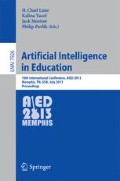Abstract
Multiple graphical representations can significantly improve students’ learning. To acquire robust knowledge of the domain, students need to make connections between the different graphical representations. In doing so, students need to engage in two crucial learning processes: sense-making processes to build up conceptual understanding of the connections, and fluency-building processes to fast and effortlessly make use of perceptual properties in making connections. We present an experimental study which contrasts two hypotheses on how these learning processes interact. Does understanding facilitate fluency-building processes, or does fluency enhance sense-making processes? And consequently, which learning process should intelligent tutoring systems support first? Our results based on test data and tutor logs show an advantage for providing support for sense-making processes before fluency-building processes. To enhance students’ robust learning of domain knowledge, ITSs should ensure that students have adequate conceptual understanding of connections between graphical representations before providing fluency-building support for connection making.
Access this chapter
Tax calculation will be finalised at checkout
Purchases are for personal use only
Preview
Unable to display preview. Download preview PDF.
References
Schwonke, R., Ertelt, A., Renkl, A.: Fostering the translation between external representations. Does it enhance learning with an intelligent tutoring program? In: Zumbach, J., et al. (eds.) Beyond Knowledge: The Legacy of Competence, pp. 117–119. Springer, Netherlands (2008)
Koedinger, K.R.: Toward evidence for instructional design principles: Examples from Cognitive Tutor Math 6. In: 24th Annual Meeting of the North American Chapter of the International Group of the Psychology of Mathematics Education. ERIC/CSMEE Publications, Athens (2002)
NMAP: Foundations for Success: Report of the National Mathematics Advisory Board Panel. U.S. Government Printing Office (2008)
Charalambous, C.Y., Pitta-Pantazi, D.: Drawing on a Theoretical Model to Study Students’ Understandings of Fractions. Educational Studies in Mathematics 64, 293–316 (2007)
Ainsworth, S.: DeFT: A conceptual framework for considering learning with multiple representations. Learning and Instruction 16, 183–198 (2006)
Koedinger, K.R., Corbett, A.T., Perfetti, C.: Knowledge-Learning-Instruction Framework: Bridging the Science-Practice Chasm to Enhance Robust Student Learning. Cognitive Science 36, 757–798 (2012)
Seufert, T.: Supporting Coherence Formation in Learning from Multiple Representations. Learning and Instruction 13, 227–237 (2003)
Bodemer, D., Ploetzner, R., Feuerlein, I., Spada, H.: The Active Integration of Information during Learning with Dynamic and Interactive Visualisations. Learning and Instruction 14, 325–341 (2004)
Arroyo, I., Royer, J.M., Woolf, B.P.: Using an intelligent tutor and math fluency training to improve math performance. I. J. of AIED 21, 135–152 (2011)
Kellman, P.J., Massey, C.M., Roth, Z., Burke, T., Zucker, J., Saw, A., Aguero, K., Wise, J.: Perceptual learning and the technology of expertise: Studies in fraction learning and algebra. Pragmatics & Cognition 16, 356–405 (2008)
Rau, M.A., Aleven, V., Rummel, N., Rohrbach, S.: Sense Making Alone Doesn’t Do It: Fluency Matters Too! ITS Support for Robust Learning with Multiple Representations. In: Cerri, S.A., Clancey, W.J., Papadourakis, G., Panourgia, K. (eds.) ITS 2012. LNCS, vol. 7315, pp. 174–184. Springer, Heidelberg (2012)
Renkl, A.: The worked-out example principle in multimedia learning. In: Mayer, R. (ed.) Cambridge Handbook of Multimedia Learning, pp. 229–246. Cambridge University Press, Cambridge (2005)
Van Gog, T., Paas, F.: Instructional efficiency: revisiting the original construct in educational research. Educational Psychologist 43, 1–11 (2008)
Cohen, J.: Statistical Power Analysis for the Behavioral Sciences. Lawrence Erlbaum Associates, Hillsdale (1988)
Koedinger, K.R., Baker, R., Cunningham, K., Skogsholm, A., Leber, B., Stamper, J.: A data repository for the EDM community: The PSLC Data-Shop. In: Romero, C., et al. (eds.) Handbook of Educational Data Mining, pp. 10–12. CRC Press, Boca Raton (2010)
Author information
Authors and Affiliations
Editor information
Editors and Affiliations
Rights and permissions
Copyright information
© 2013 Springer-Verlag Berlin Heidelberg
About this paper
Cite this paper
Rau, M.A., Aleven, V., Rummel, N. (2013). Complementary Effects of Sense-Making and Fluency-Building Support for Connection Making: A Matter of Sequence?. In: Lane, H.C., Yacef, K., Mostow, J., Pavlik, P. (eds) Artificial Intelligence in Education. AIED 2013. Lecture Notes in Computer Science(), vol 7926. Springer, Berlin, Heidelberg. https://doi.org/10.1007/978-3-642-39112-5_34
Download citation
DOI: https://doi.org/10.1007/978-3-642-39112-5_34
Publisher Name: Springer, Berlin, Heidelberg
Print ISBN: 978-3-642-39111-8
Online ISBN: 978-3-642-39112-5
eBook Packages: Computer ScienceComputer Science (R0)

